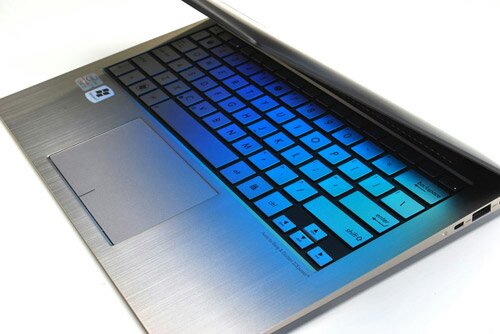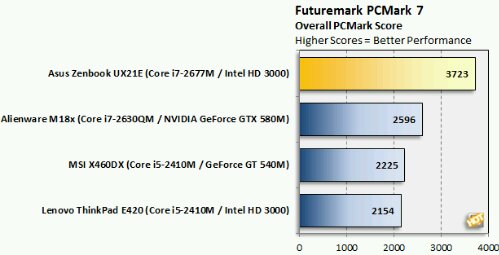
Ive just read through 8 pages of Asus UX21 review and come away with a very positive feeling. You’ll probably experience the same too because the UX21 beats quite a few more expensive devices in a general performance test and even gets some positive comments about gaming on the platform but it is the SSD that’s really responsible here. The balance of great processing capability and an SSD that removes any significant traces of bottlekneck is proving itself.
“If ever there was a “Poster Child” for the benefits of SSDs, especially in notebook platforms, it would have to be the Zenbook UX21. “
As a result of the extremely fast SSD the UX21 beats more expensive laptops in the general computing benchmark, PC Mark 7.

I’m also surprised to see positive words about the keyboard and trackpad. Others haven’t beem so positive. [See The Verge’s Review of the UX31 for example]
“ Its oversized two button trackpad is also reasonably accurate and responsive. No issues or complaints here for us.”
Read through the full review here.
HotHardware – Asus UX21 Review











Very encouraging!! Thanks for the post!
Joanna Stern has a nice review of the UX31 on her new site:
http://www.theverge.com/2011/11/1/2528456/asus-zenbook-ux31-review
One thing I’m curious of is that she notes that of the two models 128gb SSD and 256gb SSD, the 128 was noticeably faster. Any clue as to why? And should we expect the same in other Ultrabooks?
The space requirements required that ASUS source an SSD with all NAND chips on a single side; ADATA provided a SandForce-based 128GB SSD with the best perf-to-price specs, but their 256GB SSD was not available with NAND only on one side so they went with SanDisk for the 256GB SSD.
Adam
Short answer: They have different perf aspects because they’re completely different SSDs.
Adam
I really wouldn’t take anything TheVerge has to say too seriously. While I’m glad most of the Apple-leaning editors left Engadget (Josh, Nilay, Paul, Joanna) if you listen to any of their podcasts you’ll know exactly where their bias is.
If you consider that Joanna will never give a non-Apple laptop anything above an 8 (9 is reserved for Apple only) then deducting 1 point down to 7 makes sense. In the real world though with updated drivers & non-bias reviews this laptop would probably receive around a 9.
Oh, I completely agree. Their Apple bias used to anger me, but I’ve gotten over it and read their reviews with the knowledge of their bias. (The same goes for most Gizmodo editors, IMHO).
That said, even though the rating was fairly low, she appeared to be very impressed with the hardware of the UX31, only being disappointed by the trackpad software and lack of backlight.
Anyway, great call and thanks for pointing that out.
I didn’t read the rating (those are the things I don’t rate!)
The review was largely positive apart from the touchpad issue which I’ve read about from others too.
Hopefully Asus can get some tweaked drivers out for the touchpad otherwise it really is a very serious issue.
Yes, the machine maybe fast with SSD but battery life stinks. In todays world, people are looking for nothing less than 6 hours. No point having a super light machine when the machine dies on you during the first half of the day. This stinks. Pay a bomb for a machine that can only last 3 to 4 hours.
Agree completely. The Gen1 Ultrabooks are ultra light, ultra thin, & ultra expensive but have just generally “MEH” battery life and screens.
If the Ivy Bridge Gen2 Ultrabooks can manage ultra long battery life and ultra nice screens they’ll be deserving of their moniker and price points. (I’d still prefer to see a little less “ultra” and a little lower price points, myself, though.)
Before all the hype of ultrabooks, if any manufacturer came out with a pricey notebook or netbook which gave 3 to 4 hours of usage, it would be frowned upon and criticised heavily.
But now, we don’t dare say anything. Infact, the reviewer of hothardware goes on to say that the UK21 has “respectable battery life”.
Read past reviews in the past 2 years of any IT mag and see that notebooks or netbooks that gave lesser than even 4 hours usage were categorized as “poor battery life”
Are we all suckers to hype?
Theres no hype here. These are 1.2kg devices. If you want light, this is a fantastic achievement. If youre happy with 2kg, there are plenty of battery-loaded options. Beware of hard-use though because the mobile cpus can suck juice twice as fast as the Ultrabook platforms.
I’m glad to see there’s another battery life enthusiast around who’s feeling abandoned by Intel this time around, Michael.
Chippy has a good point; battery life in a 1.2KG machine will necessarily be lower; the Macbook Air has shown this for a while.
BUT it certainly looks like the Toshiba Z830 is about to prove that it’s possible to build a 1.12kg machine with an 8 hour battery life so the other MFGRs are going to be put to shame if they try to say that their 1.2 or 1.3 KG machines can’t do the same.
I think many of the reviewers are glad to see the new designs and thinner/lighter and more perf and therefore downplay the battery life issues. Anandtech did almost the exact same thing as Hothardware with their first reviews of mobile Sandybridge; focusing on how much the battery is per watt and talking about the theoretical technologies in the CPU that made the battery life better than it otherwise would have and made generic statements like “respectable battery life”, too. -The component MFGRs need to be held to account if battery life DECREASES with a next gen part; regardless of what happens with perf-per-watt. Perf-per-watt increase are obviously a critical part of this, but if over-all battery life still decreases, YOU’RE DOING IT WRONG!
I think it’s fair for mobile enthusiasts to do the same for the PC MFGRs; if they’re going to deliver us thinner and lighter machines that’s FINE as long as they keep battery life at 8 hours. -Make it as thin and light as you can, but don’t you dare release a 3 or 4 or 6 hour battery life in what is supposed to be a mobility product!
(Lenovo has some great and great looking products in their consumer-oriented line-up but their battery life stats in their consumer products SUCK. Their highest end product gets 8 hours, their next highest end product gets 6, the lower end gets 4. They seem to be tweaking this for v.Next to be 8 hours, 7 hours, and 6 hours.. Again, mobility products need to have at least an 8 hour battery life.)
I know Lenovo is trying to create a “Good, Better, Best” lineup and they’re trying to leverage battery life numbers to tell that story but that only works if you don’t compare between vendors; when you do Lenovo’s lineup doesn’t look so great.
They need to just stick with 8 hour batteries in the whole lineup and focus on other items to create good, better, best differentiation. (Putting the fast charge or longer life batteries in the high-end products; letting weight and thickness differentiate the product, etc…)
I’m with you 100% Michael. Battery life has taken a hit this gen and people who care about such things need to push back about it; the performance and design nuts got what they wanted this time around to our detriment.
Adam
I think the best way to put it is that the PC MFGRs have focused on the “swing voters” with this product generation.
All effort at the has gone into attracting the PC users who are most likely to switch to Mac (because of reasons of asthetics) and we’ve just been categorized as the “core voter” who’s less likely to defect, so they don’t feel that they need to listen to us as much.
Alienate the consumers that have supported you for years and who are used to frequent hardware refreshes to try and gain customers who might not choose your products no matter what you do -that’s a bone-headed move.
(Some people are going to buy a Mac no matter what a PC can do, what it looks like, or what it costs.)
Adam
http://hothardware.com/Reviews/Asus-Zenbook-UX21-Ultrabook-Review-The-New-Thin/?page=7